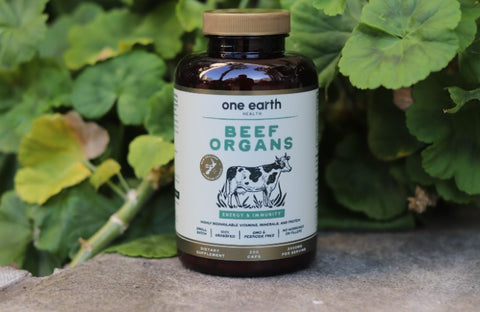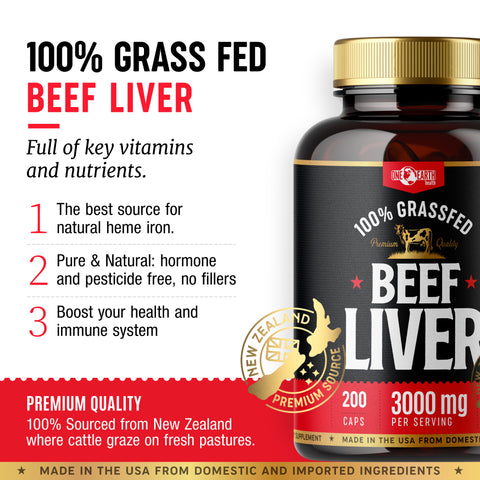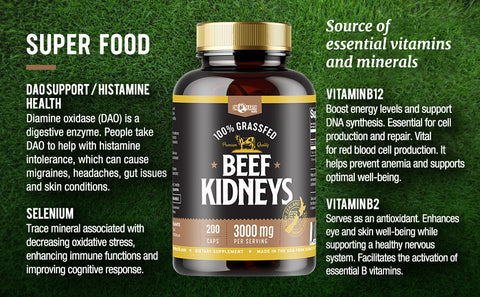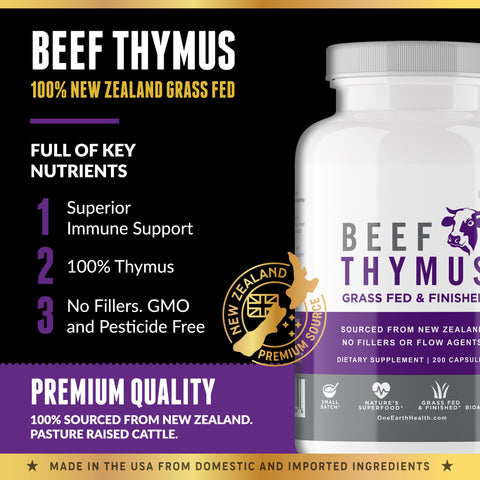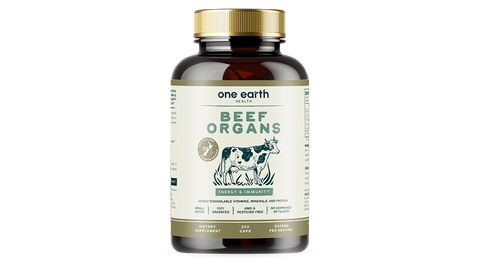Do Beef Organs Have Iron?
Posted by FAISAL TOOR
Beef organs are excellent sources of iron. While beef liver is one of the most iron-rich organs out there—packing 5 milligrams of iron per 3-ounce serving—don't underestimate the iron-boosting powers of the spleen, heart, and other bovine organs.

Article jumplinks:
Do organ meats contain more iron than muscle meat?
How much iron do you need per day?
How much iron is in our beef organ supplements?
The best beef organ supplements
Bovine organs such as the liver and the spleen play a vital role in the animal's body by helping to store and circulate oxygen in the blood. To do this important job, they need to be packed with iron. Other organs that do not play a direct role in oxygen storage or circulation still contain higher levels of iron than muscle meat due to their unique functions and metabolic requirements.
If you want to reap the health benefits of organ meats without having to cook them yourself, our beef organ supplement offers a convenient way to get all the iron-rich goodness in an easy-to-take capsule.
The Importance of Iron in Diet
Iron is a vital mineral that helps maintain your health and well-being. It's an essential component of hemoglobin, a protein found in your red blood cells that transports oxygen from your lungs to the rest of your body. With insufficient iron, your body can't make enough hemoglobin to carry oxygen to all your tissues and organs, which can leave you feeling tired and weak.
Iron deficiency can lead to more serious health problems such as anemia. In more severe cases, it may even lead to heart problems.
There are two types of iron: heme and non-heme.
- Heme iron is found in animal-based foods such as meat, poultry, and fish, and is more easily absorbed by your body.
- Non-heme iron is typically present in plant-based sources such as fruits, vegetables, and grains. This type is less readily absorbed, which is why you need to take vitamin C alongside non-heme iron to enhance its absorption.
Apart from producing hemoglobin, here are more reasons why iron is so important for health:
- Iron supports the immune system, helping your body fight off infections and diseases.
- Iron plays a crucial role in energy metabolism, allowing the body to convert food into usable energy.
- Proper iron intake promotes cognitive functions such as memory, attention, and learning.
- Iron supports healthy pregnancy, aiding in fetal growth and development.
- Sufficient iron levels help maintain healthy skin, hair, and nails.
- Iron assists in the production of hormones and neurotransmitters that regulate bodily functions.
- Adequate iron intake improves endurance and reduces fatigue.
- Iron supports muscle health and strength.
To ensure you're getting enough iron, consume a balanced diet that includes iron-rich foods. Good sources of iron include red meat, poultry, fish, beans, lentils, and dark leafy greens. Certain beef organs are exceptional sources of iron.
Are Beef Organs Rich in Iron?
Some beef organs (variety meats) are incredibly rich in iron because of their unique vital roles in the body. The heme iron found in bovine organs is more easily absorbed by the human body compared to non-heme iron from plant sources. Iron is essential for the proper function of nearly all organs, and when consumed as part of a balanced diet, beef organs can provide a significant boost to our iron levels.
If you're feeling a bit low on iron and want to give your body a natural boost, beef organs are the perfect choice for upping your heme iron intake. Here’s how much iron 100 grams (3 ounces) of the most common beef organs contain:
|
Beef liver |
Beef heart |
Beef kidney |
Beef pancreas |
Beef thymus |
Beef spleen |
|
4.9 mg |
4.31 mg |
4.6 mg |
2.22 mg |
2.1 mg |
44.6 mg |
While some beef organs are excellent dietary sources of iron, others are less iron-rich. Target the following organs to give your body that boost of iron it needs.
Beef Liver Is Packed With Iron
The high iron content in beef liver is one of the main reasons why this beef organ is the ultimate nutritional powerhouse. Beef liver is great for people who struggle with iron deficiency, as this iron-rich organ helps replenish iron stores and alleviate fatigue, weakness, and shortness of breath.
A single 3-ounce (100-gram) serving of raw beef liver contains around 5 mg of the highly bioavailable form of iron. According to the National Institutes of Health (NIH), this amount is about 28% of the daily recommended intake for adult men. This makes it one of the best dietary sources of iron available.
Interestingly, cooked liver contains slightly more iron than raw organs. According to the U.S. Department of Agriculture (USDA), braising beef liver bumps the iron content up to 6.54 mg per 100 grams, while pan-fried liver delivers a solid 6.17 mg.
Not only does cooking make the liver more appetizing, but it also gives its iron content a little extra oomph. So, if you want to keep your oxygen flowing strong, your energy levels high, and your overall health in tip-top shape, add some grass-fed beef liver to your menu.
For those not quite ready to commit to cooking liver, our beef liver supplement delivers all the iron-rich goodness in a simple, convenient capsule.
Iron Content in Beef Heart
Beef heart is another organ meat that's rich in iron. A 3-ounce serving of beef heart provides 4.31 mg of heme iron. The iron in beef heart is crucial for the synthesis of hemoglobin and myoglobin, two proteins heavily involved in oxygen transport and storage in the body. This makes beef heart perfect for those low on iron.
Similar to cooked liver, cooked beef heart packs a bit higher iron content: 100 grams of simmered beef heart contains around 6.38 mg of heme iron.
If you want to support your heart health and boost your energy levels, our beef organ supplements contain both the offal liver and the heart. These nutrient-dense supplements deliver a concentrated dose of iron, vitamin B6, vitamin B12, magnesium, selenium, and many other essential nutrients.
The Benefits of Iron-Rich Beef Kidneys
Beef kidneys are an excellent source of iron. A 3-ounce serving provides 4.6 mg of heme iron. As this type of iron is easily absorbed by the body, beef kidneys are an excellent choice for people looking to boost their iron intake.
The iron and selenium found in beef kidneys work together to support nearly every aspect of your health. Iron supports energy production, while selenium acts as a powerful antioxidant, protecting your cells from oxidative stress and promoting a healthy immune response.
Whether you enjoy them grilled, sautéed, or added to stews and soups, beef kidneys are a nutritious way to support your overall health and well-being. If you don’t know how to cook kidneys, you can rely on our grass-fed beef kidney supplements to get that boost of iron and other essential nutrients.
Beef Pancreas Contains High Amounts of Iron
While not as iron-packed as the liver or the heart, beef pancreas is also a rich source of iron. A 3-ounce serving of beef pancreas contains about 2.22 mg of heme iron The iron found in the beef pancreas plays a vital role in:
- Immune system support
- Production of certain hormones
- Healthy skin, hair, and nails
While the pancreas is a nutrient-dense organ, it's not a common ingredient in most American diets. Many people are hesitant to try beef pancreas due to its unique taste and texture, which can be described as slightly sweet and tender, with a creamy consistency.
For those who are interested in reaping the nutritional benefits of beef pancreas but are not keen on preparing and consuming the organ itself, beef organ supplements by One Earth Health are the way to go.
Iron Content in Beef Thymus
Beef thymus contains a decent amount of iron. A 3-ounce serving of beef thymus provides approximately 2 mg of iron. While this may not seem like much compared to the liver or heart, it offers an iron boost alongside other unique health benefits.
While beef thymus isn't directly involved in blood cell production or oxygen transport like some other organs, it still contains valuable heme iron that your body can easily absorb. Plus, the thymus plays a key role in keeping the immune system strong. It plays a crucial role in the development and maturation of the animal's immune system by producing and training T-lymphocytes, a type of white blood cell that helps defend the body against pathogens. This makes it an important addition to your diet.
Our beef thymus supplement is packed with easily absorbed heme iron and other essential nutrients such as protein, zinc, and vitamin C to help support your immune function, promote overall well-being, and keep your body running strong.
Iron Content in Beef Spleen
Did you know that beef spleen is the king of iron-rich organ meats? It even surpasses the liver in terms of iron content, packing a whopping 44.6 mg of heme iron per 100 grams of raw meat. This incredible concentration of iron makes beef spleen a true superfood for anyone looking to ramp up their iron intake and keep deficiencies at bay.
Bovine spleen works tirelessly to filter blood, store iron, and help keep your immune system in tip-top shape. It also contains a host of other essential nutrients such as vitamin C, vitamin B12, and selenium that work in harmony with iron to support your overall health and well-being.
If you're ready to supercharge your iron intake, our beef organ supplement is your one-stop shop for nutrient-dense goodness. Packed with the power of the liver, heart, kidneys, pancreas, and spleen, this mighty formula delivers a concentrated dose of easily absorbed heme iron and other essential nutrients to keep your body running strong.
Iron in Organ Meat vs Muscle Meat
While cuts of meat such as ground beef, steak, and brisket contain some iron, they can't hold a candle to the iron content found in variety meats. Check out this table comparing the iron levels per 100 grams of the following beef muscle meats:
|
Lean ground beef |
Beef tenderloin |
Beef brisket |
Beef chuck eye steak |
Beef ribeye steak |
|
2.41 mg |
2.7 mg |
2.11 mg |
2.36 mg |
2.44 mg |
These popular cuts offer less than 3 mg of iron per 3 ounces of meat. Compared to beef organs, the numbers are much less impressive. Beef organs are nature's multivitamins, providing not just iron but a wide array of essential vitamins and minerals that can help keep your body functioning at its best.
How Much Iron Do You Need Every Day?
The amount of iron a person needs depends on their age, sex, and life stage. Here's the recommended daily iron intake for different groups:
- Children have different iron needs as they grow and develop.
- Infants from birth to 6 months require 0.27 mg of iron per day, while those aged 7–12 months need 11 mg.
- As kids reach 1–3 years, their daily iron requirement is 7 mg.
- This amount increases to 10 mg for ages 4–8.
- Kids ages 9–13 need around 8 mg per day.
- Adolescents have higher iron needs due to rapid growth and the onset of menstruation in girls.
- Boys aged 14-18 require 11 mg of iron daily.
- Girls in the same age range need 15 mg per day.
- Adult men aged 19 and older have a consistent daily iron requirement of 8 mg.
- Women have varying needs based on their life stage.
- From ages 19–50, women require 18 mg of iron per day, primarily due to blood loss during menstruation.
- After age 51, women's daily iron needs decrease to 8 mg, the same as men.
Certain life stages and conditions increase iron requirements.
- During pregnancy, women need 27 mg of iron per day to support fetal growth and development.
- Breastfeeding also increases iron needs, with women aged 14–18 requiring 10 mg daily and those aged 19–50 needing 9 mg.
Regardless of age or gender, bovine organs are an excellent way to boost your iron intake. For pregnant or breastfeeding women, and those dealing with anemia, our collection of beef organ supplements can help you meet your increased iron needs and support your overall health.
Organs such as the liver, heart, and kidney are some of the most concentrated sources of heme iron. We’ve combined them all (in addition to beef spleen and pancreas) in our ultimate beef organ supplement. So if you're looking for a convenient way to supercharge your iron intake, our line of grass-fed, pasture-raised beef organ supplements is a one-stop-shop for all your iron needs.
How Much Iron Is in Beef Organ Supplements?
For people who can’t stomach beef organs (no pun intended), we have the solution: our beef organ supplements are a convenient way to boost your iron intake. Our beef liver supplement delivers 3000 mg of iron-rich beef liver per serving. Remember that a 100-gram serving contains 4.9 milligrams of iron and that the amount of iron depends on the quality of the supplement. Grass-fed, organic supplements (such as ours) are more likely to be rich in this mineral. Apart from the concentrated dose of highly bioavailable heme iron, this supplement also packs essential nutrients such as vitamin A, vitamin B2, and folic acid.
Our beef kidney supplement is another nutrient-dense powerhouse packed with protein, minerals, omega-3 fats, selenium, B vitamins, and iron. It delivers 3000 mg of grass-fed beef kidney, which translates to a lot of iron richness. Together with all the other nutrients, our kidney supplement supports your heart health, boosts immunity, and promotes cell function in a convenient, easy-to-take form.
Our supplements aren’t just about the iron; the organs of animals are some of the most nutrient-dense sources of vitamins, minerals, and other beneficial compounds often lacking in the modern human diet. When you incorporate them into your daily routine, you're not only supporting your health and well-being but also taking a proactive step towards preventing health conditions such as iron deficiency anemia and cardiovascular disease.
Try the Best Beef Organ Supplements
In a world where the standard American diet often falls short on key nutrients, our organ meat supplements swoop in to save the day. We've got a power-packed blend of nutrient-dense organs such as the liver, heart, kidney, pancreas, spleen, thymus, and even bone marrow and trachea, all rich in essential amino acids, vitamins, and minerals.
We source our offal from small family farms where the cattle roam freely on lush, green pastures. No sketchy additives or artificial junk here—just pure, unadulterated goodness packed into easy-to-swallow capsules. When you incorporate our grass-fed beef organ supplements into your daily routine, you'll be giving your body the building blocks it needs to optimize bodily functions, from energy production and muscle mass maintenance to brain health and cardiovascular health.
Our supplements are just as good as (if not better than) the big names such as Ancestral Supplements and Heart & Soil. Except that we're all about delivering top-notch quality without the gimmicks or the hefty price tag.
Give your body the iron-rich high-five it deserves and join the One Earth Health family today.

Iron in Beef Organs FAQ
Who should not eat liver?
People with certain health conditions, such as gout, kidney disease, or iron overload disorders (hemochromatosis) should talk to their doctor before consuming liver. Bovine organs such as the liver are high in purine and iron. High purine content can exacerbate gout symptoms, while elevated iron levels can worsen kidney function and lead to excessive iron accumulation in the body.
Is beef liver good for iron deficiency?
Beef liver is an excellent food choice for those struggling with iron deficiency anemia. A single 3-ounce serving of beef liver provides approximately 5 mg of highly bioavailable heme iron, which is easily absorbed by the body. If you regularly incorporate beef liver into your diet, you can help replenish iron stores and alleviate symptoms of iron deficiency.
How often should I eat beef for iron?
Your individual needs and overall diet will help determine how often you should eat beef to get your iron. Aim to include lean cuts of beef or beef organ meats, such as liver, heart, or kidney, in your meals 2–3 times per week to ensure an adequate supply of heme iron. Make sure you eat beef as part of a balanced diet that also includes other iron-rich foods, such as leafy greens, legumes, and fortified grains.
Does exercise increase iron?
While exercise itself does not directly increase iron levels in the body, it can improve the body's ability to absorb and utilize iron. Regular physical activity promotes healthy blood flow, which helps transport oxygen and nutrients, including iron, to various tissues and organs. Intense exercise may lead to iron loss through sweat, so athletes and highly active people should pay extra attention to their iron intake to maintain optimal levels.
What foods block iron absorption?
Foods that are high in the following compounds can block iron absorption:
- Phytates: found in whole grains, legumes, and nuts.
- Calcium: dairy products and calcium supplements can reduce iron absorption.
- Polyphenols: present in tea, coffee, red wine, and certain vegetables.
- Oxalates: found in spinach, chard, and beet greens.
To maximize iron absorption, consume iron-rich foods alongside sources of vitamin C and limit the intake of these iron-inhibiting compounds during meals.
Does beef organ consumption reduce food waste?
Beef organs help reduce food waste by utilizing parts of the animal that are often discarded. When you incorporate these nutrient-dense cuts into your diets and adhere to the practices of regenerative agriculture, you can make better use of the entire animal and minimize food waste in the beef industry.
Why do people eat beef tripe and tongue?
Beef tripe and tongue are enjoyed in many cuisines worldwide for their unique flavors, textures, and nutritional benefits. Tripe, which is the edible lining of cow stomachs, is a good source of protein and essential nutrients like vitamin B12 and selenium. Beef tongue, on the other hand, is tender and rich in fat-soluble vitamins, zinc, and iron. These organ meats not only add variety to the diet but also provide a range of nutrients that support overall health.
Are beef organs keto-friendly?
Beef organs are an excellent choice for those following a ketogenic diet. Organ meats are naturally low in carbohydrates and high in protein and healthy fats, making them a perfect fit for the high-fat, moderate-protein macronutrient profile of the keto diet. Add nutrient-dense beef organs to your weekly menu to ensure adequate intake of essential vitamins and minerals while maintaining ketosis.
Are beef organs rich in minerals?
Beef organs are incredibly rich in essential minerals. Here's a closer look at some of the key minerals found in beef organs:
- Iron: beef organs, particularly the liver, heart, and spleen, are among the best dietary sources of highly bioavailable heme iron. Adequate iron intake is crucial for preventing anemia, supporting muscle growth, and maintaining overall energy levels.
- Zinc: beef organs are also an excellent source of zinc, a mineral that plays a vital role in immune function, wound healing, and reproductive health. Zinc is also important for maintaining healthy skin, hair, and nails.
- Selenium: beef organs, especially the kidney and heart, contain significant amounts of selenium, a trace mineral that acts as a powerful antioxidant. Selenium helps protect cells from oxidative damage and supports thyroid function.
- Copper: beef liver is a rich source of copper, a mineral that works in tandem with iron to form red blood cells and maintain healthy blood vessels, nerves, and bones.
- Phosphorus: beef organs are a good source of phosphorus, a mineral that's essential for strong bones and teeth, as well as proper kidney function and energy production.
Incorporate nutrient-dense beef organs into your diet to get the essential minerals you need to support health and well-being.
Resources
Office of Dietary Supplements - Iron. (n.d.). https://ods.od.nih.gov/factsheets/Iron-Consumer/
U.S. Department of Agriculture FoodData Central. (n.d.). https://fdc.nal.usda.gov/fdc-app.html#/food-details/168626/nutrients
U.S. Department of Agriculture FoodData Central. (n.d.). https://fdc.nal.usda.gov/fdc-app.html#/food-details/168627/nutrients
